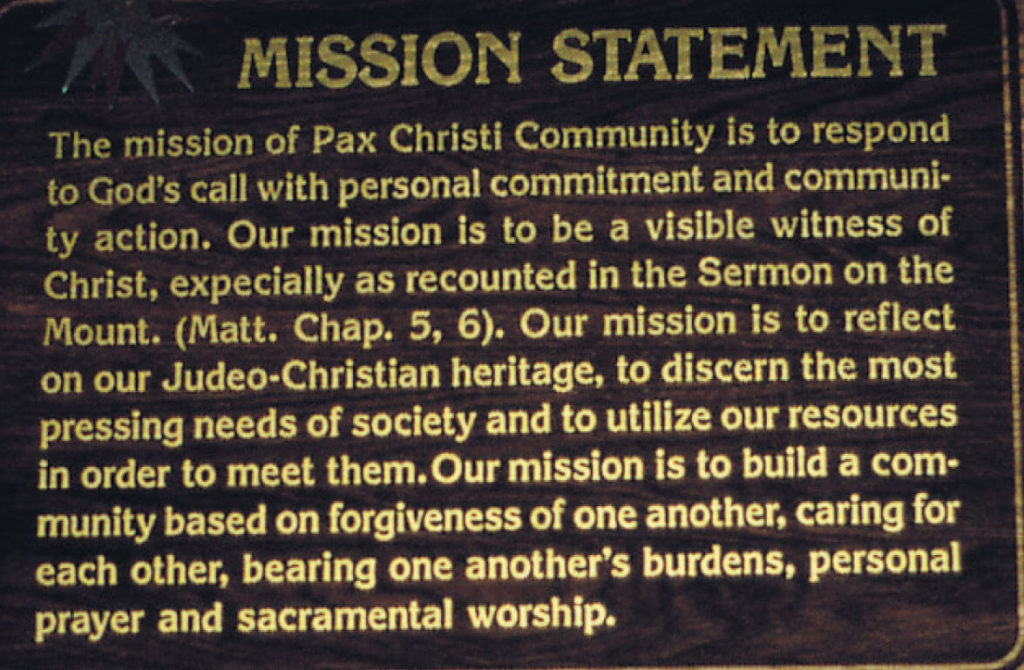
The inside master key to the theology of Luke’s gospel is the word fulfilled in verse one, chapter one. The third gospel writer explains he has collected what the eyewitnesses and ministers of the word have handed on about how Jesus fulfills the scriptures. In chapter four Luke supplies the key passage Jesus fulfills, a passage that opens the door to Jesus’ mission. The key passage announces good news for the poor but makes unbelievable claims in the ears of Jesus’ home folks.
Jesus’ words are not new to the people who are listening to him in the synagogue at Nazareth. They come right out of the book of the prophet Isaiah. What is new is Jesus’ claim to fulfill the prophetic words.
In Jesus’ mission the Church remembers the awesome value of human beings and encourages us to reflect again on our far-too-frequent temptation to devalue various people who don’t seem to measure up quite well enough.
And who makes the list of people the prophet specifically singles out for compassion? Prisoners. Prisoners! They are on the to-do list that Jesus takes up at the outset of his own ministry, as recorded in Luke’s gospel.
When the book of the prophet Isaiah was handed him, Jesus unrolled the scroll and found the passage where it was written: “The Spirit of the Lord is upon me, therefore he has anointed me. He has sent me to bring glad tidings to the poor, to proclaim liberty to captives, recovery of sight to the blind and release to prisoners.”
The prisoners make the list along with the poor, the weak, and the disabled — the ones about whom it is the very easiest to say, “not worth it.” They are the ones who seem to take more from society or from individuals than they give, the ones about whom we might ask, “What good have they ever done for us?”
As Jesus so vividly points out, we humans are in this thing together. In this amazing and wonderful and occasionally painful journey called life, none of us deserves to be a part of it any more than the most burdensome companion does. It isn’t up to us to be alive and be here. Thank God for that. Nor is it up to us not to be here.
It is God who is the great keeper of the keys, who has given us other keys of all shapes and sizes to care for and who tells us, in effect, “If you can’t figure out why this key or that one is on the ring, then hold tight to it until you do understand.” Everyone one knows not to toss keys because their usefulness isn’t immediately obvious.
Can we have the same regard for people? As Andy Rooney said, “I don’t know what they’re for and I don’t dare throw them away. Obviously they open important places in my life. But where?”
- Talk about a time when a person surprised you by offering gifts to a community that you didn’t know he or she had.
- Who in the news needs help today?
- When has someone given you help that you could not pay back?
Perhaps some of those stray keys — some of those prisoners or poor or disabled or otherwise supposed undesirable folks — may open important places inside of us, like the towers of arrogance, the locked doors of self-deception, or the vaults of false pride. Perhaps those keys can open up and let fresh breezes blow into the darkened inner rooms in us from which come the voices that say, “You’re a hand, not a foot, and the body doesn’t need you.”
This important gospel can instill in us a reverence for the most useless of the keys. One of them will indeed prove itself to be an inside master — the one that transforms us. That will happen as long as we welcome those who seem so undesirable and have compassion for them. No key on the ring is expendable; we cast any of them aside at our own peril.
- Who has been a surprise inside master for you?
- When has a community welcomed you even though you didn’t feel that you deserved to belong? What happened?
- What is a concrete way you have helped Jesus’ mission progress in your neighborhood? In our world?
